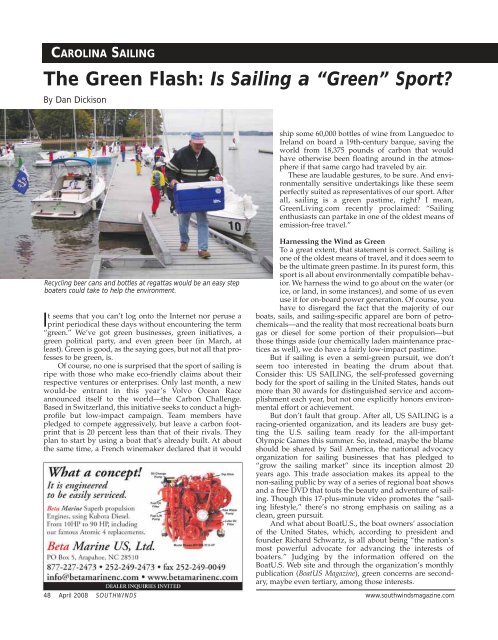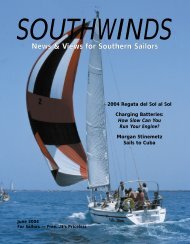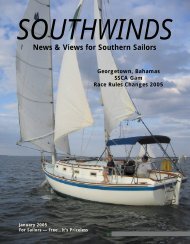Read PDF - Southwinds Magazine
Read PDF - Southwinds Magazine
Read PDF - Southwinds Magazine
- No tags were found...
Create successful ePaper yourself
Turn your PDF publications into a flip-book with our unique Google optimized e-Paper software.
CAROLINA SAILINGThe Green Flash: Is Sailing a “Green” Sport?By Dan Dickisonship some 60,000 bottles of wine from Languedoc toIreland on board a 19th-century barque, saving theworld from 18,375 pounds of carbon that wouldhave otherwise been floating around in the atmosphereif that same cargo had traveled by air.These are laudable gestures, to be sure. And environmentallysensitive undertakings like these seemperfectly suited as representatives of our sport. Afterall, sailing is a green pastime, right? I mean,GreenLiving.com recently proclaimed: “Sailingenthusiasts can partake in one of the oldest means ofemission-free travel.”Recycling beer cans and bottles at regattas would be an easy stepboaters could take to help the environment.It seems that you can’t log onto the Internet nor peruse aprint periodical these days without encountering the term“green.” We’ve got green businesses, green initiatives, agreen political party, and even green beer (in March, atleast). Green is good, as the saying goes, but not all that professesto be green, is.Of course, no one is surprised that the sport of sailing isripe with those who make eco-friendly claims about theirrespective ventures or enterprises. Only last month, a newwould-be entrant in this year’s Volvo Ocean Raceannounced itself to the world—the Carbon Challenge.Based in Switzerland, this initiative seeks to conduct a highprofilebut low-impact campaign. Team members havepledged to compete aggressively, but leave a carbon footprintthat is 20 percent less than that of their rivals. Theyplan to start by using a boat that’s already built. At aboutthe same time, a French winemaker declared that it wouldHarnessing the Wind as GreenTo a great extent, that statement is correct. Sailing isone of the oldest means of travel, and it does seem tobe the ultimate green pastime. In its purest form, thissport is all about environmentally compatible behavior.We harness the wind to go about on the water (orice, or land, in some instances), and some of us evenuse it for on-board power generation. Of course, youhave to disregard the fact that the majority of ourboats, sails, and sailing-specific apparel are born of petrochemicals—andthe reality that most recreational boats burngas or diesel for some portion of their propulsion—butthose things aside (our chemically laden maintenance practicesas well), we do have a fairly low-impact pastime.But if sailing is even a semi-green pursuit, we don’tseem too interested in beating the drum about that.Consider this: US SAILING, the self-professed governingbody for the sport of sailing in the United States, hands outmore than 30 awards for distinguished service and accomplishmenteach year, but not one explicitly honors environmentaleffort or achievement.But don’t fault that group. After all, US SAILING is aracing-oriented organization, and its leaders are busy gettingthe U.S. sailing team ready for the all-importantOlympic Games this summer. So, instead, maybe the blameshould be shared by Sail America, the national advocacyorganization for sailing businesses that has pledged to“grow the sailing market” since its inception almost 20years ago. This trade association makes its appeal to thenon-sailing public by way of a series of regional boat showsand a free DVD that touts the beauty and adventure of sailing.Though this 17-plus-minute video promotes the “sailinglifestyle,” there’s no strong emphasis on sailing as aclean, green pursuit.And what about BoatU.S., the boat owners’ associationof the United States, which, according to president andfounder Richard Schwartz, is all about being “the nation’smost powerful advocate for advancing the interests ofboaters.” Judging by the information offered on theBoatU.S. Web site and through the organization’s monthlypublication (BoatUS <strong>Magazine</strong>), green concerns are secondary,maybe even tertiary, among those interests.48 April 2008 SOUTHWINDS www.southwindsmagazine.com
















